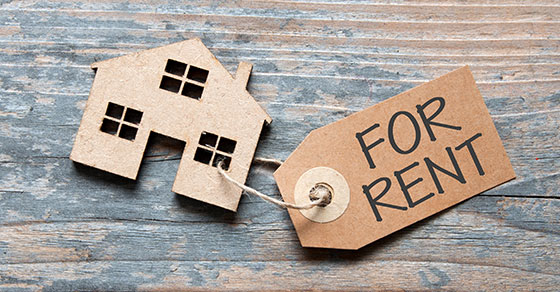If you’re buying a new home, you may have thought about keeping your current home and renting it out. In March, average rents for one- and two-bedroom residences were $1,487 and $1,847, respectively, according to the latest Zumper National Rent Report.

In some parts of the country, rents are much higher or lower than the averages. The most expensive locations to rent a one-bedroom place were New York City ($4,200); Jersey City, New Jersey ($3,260); San Francisco ($2,900); Boston ($2,850) and Miami ($2,710). The least expensive one-bedroom locations were Wichita, Kansas ($690); Akron, Ohio ($760); Shreveport, Louisiana ($770); Lincoln, Nebraska ($840) and Oklahoma City ($860).
Transitioning into a landlord and leasing out your property entails both financial opportunities and risks. It's important to understand that there are potential tax advantages and challenges associated with this decision.
Once you start renting out your residence, you're typically classified as a real estate landlord for tax purposes. This means you're required to report rental income on your tax filings. However, you're also eligible for various landlord deductions, including expenses related to utilities, operational costs, and incidental repairs (such as fixing a leaky roof). You can claim depreciation deductions for the property. Additionally, you have the ability to fully offset rental income with allowable landlord deductions.
Passive activity rules
However, under the passive activity loss (PAL) rules, you may not be able to currently claim the rent-related deductions that exceed your rental income unless an exception applies. Under the most widely applicable exception, the PAL rules won’t affect your converted property for a tax year in which your adjusted gross income doesn’t exceed $100,000, you actively participate in running the home-rental business, and your losses from all rental real estate activities in which you actively participate don’t exceed $25,000.
You should also be aware that potential tax pitfalls may arise from renting your residence. Unless your rentals are strictly temporary and are made necessary by adverse market conditions, you could forfeit an important tax break for home sellers if you finally sell the home at a profit. In general, you can escape tax on up to $250,000 ($500,000 for married couples filing jointly) of gain on the sale of your principal home. However, this tax-free treatment is conditioned on your having used the residence as your principal residence for at least two of the five years preceding the sale. So renting your home out for an extended time could jeopardize a big tax break.
Even if you don’t rent out your home long enough to jeopardize the principal residence exclusion, the tax break you would get on the sale (the $250,000/$500,000 exclusion) won’t apply to:
- The extent of any depreciation allowable with respect to the rental or business use of the home for periods after May 6, 1997, or
- Any gain allocable to a period of nonqualified use (any period during which the property isn’t used as the principal residence of the taxpayer or the taxpayer’s spouse or former spouse) after December 31, 2008.
A maximum tax rate of 25% will apply to this gain (attributable to depreciation deductions).
Selling at a loss
What if you bought at the height of a market and ultimately sell at a loss? In such situations, the loss is available for tax purposes only if you can establish that the home was in fact converted permanently into income-producing property. Here, a longer lease period helps. However, if you’re in this situation, be aware that you may not wind up with much of a loss for tax purposes. That’s because basis (the cost for tax purposes) is equal to the lesser of actual cost or the property’s fair market value when it’s converted to rental property. So if a home was purchased for $300,000, converted to a rental when it’s worth $250,000, and ultimately sold for $225,000, the loss would be only $25,000.
The question of whether to turn a home into rental property is complicated. Contact your Rudler, PSC advisor at 859-331-1717 we can help you make a decision.
RUDLER, PSC CPAs and Business Advisors
This week's Rudler Review is presented by Max Epplen, CPA and Matt Topmiller, CPA.
If you would like to discuss your particular situation, contact Max or Matt at 859-331-1717.


As part of Rudler, PSC's commitment to true proactive client partnerships, we have encouraged our professionals to specialize in their areas of interest, providing clients with specialized knowledge and strategic relationships. Be sure to receive future Rudler Reviews for advice from our experts, sign up today !